27 Handel’s Messiah in Dublin, 13 April 1742
Posted by Christine on Dec 22, 2014 in Ireland | 5 comments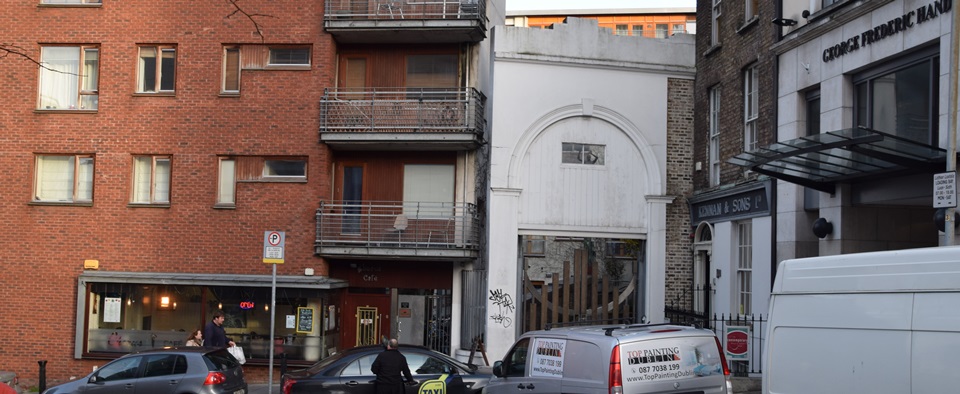
A few days ago I revived my annual Christmas ritual of playing Handel’s Messiah at full volume while I work at my desk or around the house, a practice that is exhilarating but that can also make me nostalgic and weepy—familiar Christmas emotions for many. Truth be told, I sometimes do this at other times of the year, particularly when I need a blast of energy or inspiration to get a project going.
My love of vocal music, Handel’s soaring melodies (especially those of the Messiah), and his choice of English as the language for his many of his libretti—he lived in London from 1710 to his death in 1759—have long drawn me to his work. For the most part, European musical tradition did not recognize English as a hospitable language for opera or oratorios until the nineteenth century or later. Whether he made the choice for economic, political, or musical reasons, Handel was an innovator in using English.
Here in Ireland I have the version of Messiah by the Academy of St. Martin’s in the Fields with Neville Mariner (1976), a combination that is always a good bet for baroque music. When I’m alone, I turn up the volume and sing out loud, taking the alto part or finding my place in a higher or lower octave for the rest. Let me make clear that I don’t sing well, but I do sing enthusiastically and in tune. At home in Atlanta I have about a dozen more of Handel’s oratorios and operas set up to play consecutively starting with Acis and Galatea, which I recently learned was performed by Handel while he was visiting Dublin and incorporates an Irish jig. In certain moods I allow myself a full day of Handel blasting through all the downstairs rooms.
Last December I had the great pleasure of hearing the Messiah live for the first time with the New York Philharmonic at Lincoln Center. Ron and I were sitting in the back row in two seats set apart from others, so my silent mouthing of the words and rhythmic swaying and bobbing didn’t bother anyone but Ron, who is used to my Messiah antics. At least I didn’t sing out loud or hum. It was a magnificent performance, easily the highlight of our five day culture fest in the city. The soloists were perfect, the choir brilliant, the orchestra beyond compare. I quickly used up my stash of Kleenex. And as the strains of the Hallelujah Chorus began, from our seats at the back we had an awe-inspiring view of the audience rising to its feet as if on cue. There is no evidence for the story that King George II started the tradition of standing for the Hallelujah Chorus at the London premiere or that he even attended a performance, but the practice of standing has been in place since 1756. I’d like to believe a king would honor a great piece of music in that way.
I first came upon Handel’s Messiah in the 1960s when my brother Jeff sang it with the St. Mark’s Choir at St. Mark’s Episcopal Church in Evanston, IL. Everyone loved it, and my parents immediately bought the record, which we played and played until we wore it out. One of Jeff’s household chores was to mop the black and white tile floor in the kitchen, dining room, and front hall every Saturday. He started the tradition of using a full-volume Messiah as the background for work, and I would join in from upstairs or wherever I was in the house.
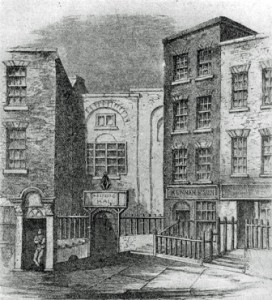
The Great Music Hall, Fishamble Street, as it looked in Handel’s day. Compare with the photo of this site today at the top of the page.
But I had been blasting out music as an accompaniment for my life for even longer than that. In the 1950s we lived in a house on Kedzie Street in South Evanston that had a paneled den with sliding doors. While the adults were sitting around the table after dinner, I’d slip into the den, close the doors, and play our parents’ records of operas and musicals ridiculously loudly while making up my own stories to fit the music, dancing around the room, and singing the words phonetically. Even today I could write out “my” words for passages from classics like La Traviata, South Pacific, and later My Fair Lady, Carmen, and Camelot.
Of course there is an Irish connection to Handel’s Messiah, a very important one. The London premiere of the Messiah paled by comparison to the actual premiere, which took place in the Great Music Hall in Fishamble Street, Dublin, a fact that the musical Londoners of the composer’s day later resented. They must have been even more annoyed that the Dublin audience warmly received the piece that would prove to be regarded as Handel’s masterwork, while the London audience was initially skeptical. The governors of Mercer’s Hospital in Dublin, a charitable organization, had invited the composer to create a work that through a series of concerts could be used to raise funds to help the sick. Handel had come to Ireland for about ten months to fulfill this commission and to give additional charity concerts; he came as the guest of the Duke of Devonshire, who was then Lord Lieutenant—head of the British power structure in the colony. As the second city of the British Empire, eighteenth-century Dublin had a lively theatre and music scene, and the venues were concentrated in the area around Fishamble Street and along the quays, the location of the medieval city.
Handel wrote the Messiah in only three weeks, it is said, shortly before his arrival in Ireland in November 1741. By March of 1742 he had brought together musicians, singers, and the choirs of the two cathedrals, St. Patrick’s and Christ Church, for the upcoming performance of the new work. On April 13 the Great Music Hall was packed with over 700 in attendance. Ladies were asked not to wear hoops and gentlemen were asked not to carry swords in order to make room for more guests in the concert hall. The performance was held at noon. Reviews were uniformly enthusiastic, and a second performance was scheduled for June 3. (For more information about Handel in Dublin, see A History of Irish Music by William H. Grattan Flood. Wikipedia also has a good article.)
Little evidence of Handel’s sojourn in Ireland remains. He apparently stayed in Abbey Street during his visit. He is thought to have performed a concert in Smock Alley Theatre (1642), which has recently been renovated and reopened as a theatre for the first time since 1787. Along with many other lamentable acts of destruction in the 1970s, the Great Music Hall in Fishamble Street was razed; only the white stone arched entryway remains (see photo at top), a graceful reminder of the momentous premiere of Messiah. Just across the River Liffey, the organ of St. Michan’s Church where, according to legend, Handel practiced for the performance, is still in use.
For me, Christmas is synonymous with Handel’s Messiah, and Handel’s Messiah is synonymous with remembering past Christmasses, my parents, my brothers’ and my childhood selves, and the family tradition—at least as defined by me and Jeff—of singing along and working around the house to recordings of that glorious, transcendent music.

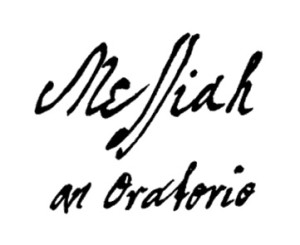
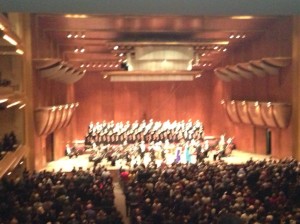
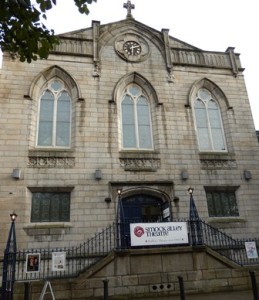
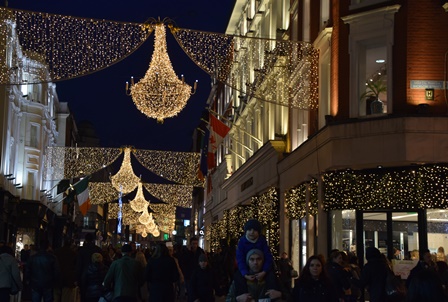
Another sing-alonger! It’s not Christmas without “The Messiah,” and countless Christmasses and performances both public and private of my singing, toe-tapping, bobbing all join to make the joy of the season come alive.
Love the NM album—and you can’t beat Acis and Galatea for an off key sing along—-I was finishing my dissertation under the gun and Michael informed me that Handel wrote the Messiah in 3 weeks—of course it didn’t take long to realize the disparity between G F and moi….it is such a joy to read your blog—and see your photos! I’m just basking in the fact that I lived through this semester—-have a lovely holiday Christine!
I am loving the surprises – the memories you invoke and more. I grew up singing loudly to LPs while cleaning on Saturdays, and my children also grew up with Handel’s Messiah, but they drew the line at Johnny Mathis, Andy Williams, and Steve and Edie, my mother’s albums. I still listen to the Messiah, daily through the month of December, if possible. All tease me, but I just enjoy the music – singing along at full voice. Eric tolerates it. But I wondered at the photo at the top – I had paused to see what I might be missing but nothing stood out to me. Thanks so much.
Kathi, The white framed archway in the top photo is all that’s left of the original concert hall. I’m so glad there’s something left! A new book about the debut of The Messiah in Dublin just came out–it’s called Hallelujah.
I guess I didn’t make it clear that I loved the surprise at the end when you explained about the arch. 🙂 And thanks for letting me know about the book!!! I’ll look for it. Cheers.